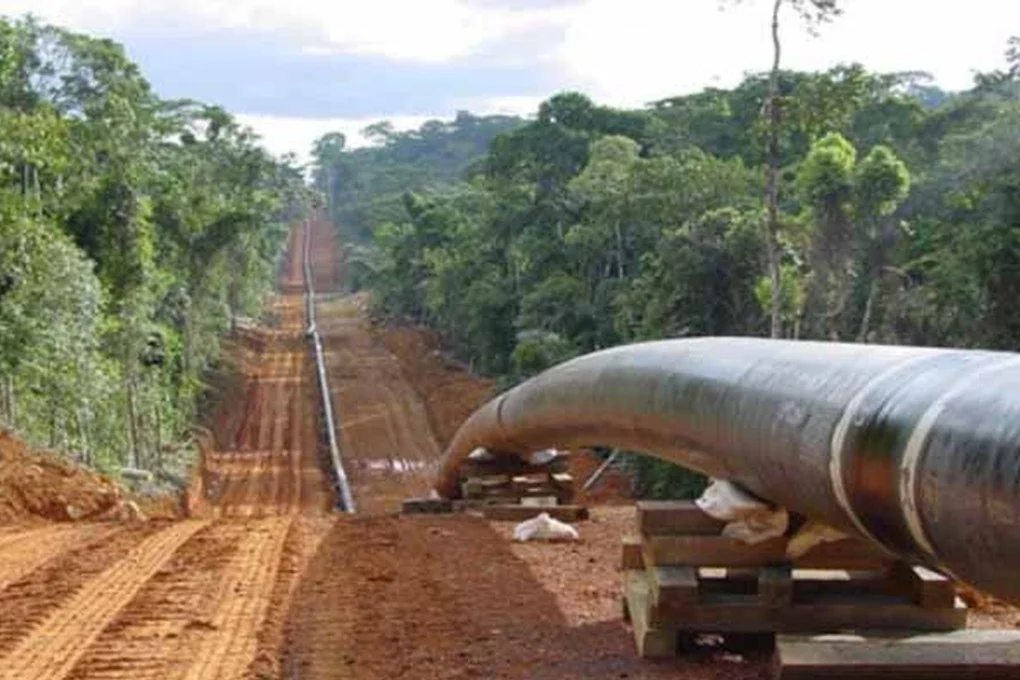CLIMATE CAPITAL
Uganda Increases Equity in $5B Oil Pipeline Amid Debt Delays
Uganda is intensifying efforts to fund the $5 billion East African Crude Oil Pipeline (EACOP), set to transport crude from western Uganda to Tanzania’s port of Tanga. Facing delays in debt financing, Uganda has increased its equity stake from 40% to 52%, Energy Minister Ruth Nankabirwa announced in a virtual interview on October 31, 2024.

: Uganda raises equity share to 52% for East African Oil Pipeline due to debt delays, securing funding for critical infrastructure boosting regional growth.
Uganda is ramping up its efforts to secure funding for the $5 billion East African Crude Oil Pipeline (EACOP), a major infrastructure project designed to transport crude oil from its fields in western Uganda to the Tanzanian port of Tanga.
In response to delays in securing debt financing, the Ugandan government has adjusted its funding structure, increasing the equity ratio from 40% to 52%, according to Uganda’s Energy Minister Ruth Nankabirwa, who spoke about the shift in a virtual interview on Tuesday, October 31, 2024.
With the new structure, debt financing will cover the remaining 48%, a move expected to enhance investor confidence and ensure smoother progress on the project.
“Uganda is committed to making this project a reality,” Nankabirwa said. “By increasing the equity ratio, we are signaling our determination to see this pipeline through to completion, despite the challenges we’ve faced in securing debt.”
The EACOP, which spans approximately 1,445 kilometres, is projected to be the longest heated crude oil pipeline in the world, traversing both Uganda and Tanzania.
The pipeline is critical to Uganda’s energy strategy as it seeks to become a net oil exporter by 2027.
First launched in 2006, Uganda’s oil industry has seen numerous delays, often related to regulatory, environmental, and financial challenges.
The pipeline project, however, gained renewed momentum in 2021 when Uganda and Tanzania signed a series of agreements, including the Host Government Agreement and the Tariff and Transportation Agreement, setting the stage for construction.
A Boost to Uganda’s Oil Ambitions
The increase in equity ratio represents a calculated shift in Uganda’s approach to financing the pipeline, which is jointly owned by Uganda, Tanzania, and oil companies TotalEnergies and China National Offshore Oil Corporation (CNOOC).
By raising its equity investment stake, Uganda is responding to global concerns around the environmental impact of fossil fuel projects, which have made some international lenders hesitant to participate.
The pipeline’s construction and eventual operation are also expected to deliver economic benefits for Uganda, potentially generating 12,000 jobs during the construction phase and contributing to Uganda’s GDP growth through oil revenues.
Uganda holds an estimated 6.5 billion barrels of oil reserves, of which 1.4 billion barrels are recoverable. The EACOP project will be instrumental in connecting Uganda’s oil fields in the Lake Albert Basin to the international market, a vital step in achieving the government’s oil production targets.
“This is a transformative project for Uganda,” said Nankabirwa. “Once completed, it will place Uganda on the map as an oil-exporting country and drive significant economic growth for our citizens.”
Progress and Challenges
Despite the anticipated economic benefits, the pipeline has faced criticism from environmental groups concerned about its ecological impact.
In 2022, activists campaigned to halt the project, citing risks to biodiversity, water sources, and the displacement of local communities.
In response, Uganda and its partners have implemented measures to mitigate environmental risks, including advanced monitoring systems and strategies for minimal land disruption.
Construction on the pipeline began in 2023 with initial site preparations, but the challenges in raising debt financing have caused delays.
The pipeline is now projected to be completed by 2027, assuming financing issues are resolved in the coming year.
According to the Ministry of Energy and Mineral Development, increasing the equity share aligns with a broader strategy to attract alternative forms of investment, particularly as Uganda seeks to diversify its funding sources.
Regional and Geopolitical Implications
The EACOP will not only strengthen Uganda’s energy sector but also fortify East Africa’s strategic infrastructure.
Tanzania, which stands to benefit through transit fees and regional influence, has also voiced its support for the project. The two countries have been actively promoting the pipeline to international investors, touting it as an avenue for regional integration and economic empowerment.
Dr. Frank Kabuiya, an economist specializing in East African regional development, highlighted the pipeline’s potential impact. “This is more than just an oil pipeline,” he noted in a recent industry roundtable.
“It’s a critical link that could shift East Africa’s standing in the global energy landscape and foster deeper regional ties.”
The increase in equity investment in the EACOP underscores Uganda’s commitment to seeing the pipeline through to completion, amidst environmental concerns and financial challenges.
The government’s decision may prove pivotal in solidifying the project’s viability, paving the way for Uganda to join the ranks of oil-exporting nations and cementing the East African region’s role in the global energy economy.
With Uganda’s equity increase, the EACOP is now one step closer to its intended launch, signaling both optimism and resilience in Uganda’s oil industry.
Keywords: Uganda oil pipeline, East African Crude Oil Pipeline, EACOP funding, Uganda equity investment, oil export infrastructure
Celebrities & Sports
Bien Aime Baraza: Kenya’s Top Spotify Artist of 2024
Bien’s music blends heartfelt lyrics with vibrant African rhythms, creating a powerful emotional connection with listeners. His hit single Inauma deeply resonated with fans, addressing themes of heartbreak and resilience, while showcasing his ability to craft compelling, introspective narratives. This track, like much of his work, blends raw emotion with the energy of African musical traditions, making it a standout in his catalog.

: Bien Aime Baraza, top Spotify artist in Kenya 2024, stands out with his soulful R&B sound and solo career success. Discover his journey and music evolution.
Bien-Aimé Baraza, widely known as Bien, has redefined the Kenyan music landscape with his soulful sound and captivating storytelling.
Crowned Spotify’s top artist in Kenya for 2024, his music spans genres, blending Afropop, R&B, and Afro-soul, making him a standout both locally and internationally.
EARLY CAREER AND RISE TO STARDOM
Bien’s music journey began at Upper Hill High School, where he formed Sauti Sol in 2006 with Savara Mudigi, Polycarp Otieno, and Willis Chimano.
The group initially sang a cappella before evolving into a multi-award-winning band. Reflecting on those formative years, Bien said, “We started as a bunch of boys who just loved to sing. We had no idea it would grow into this phenomenon”.
His passion for music was further nurtured during his studies at the United States International University, where he pursued Journalism and Media Studies.
His storytelling abilities became central to his lyrical style, characterised by emotive narratives and catchy melodies.
BREAKING AWAY FROM SAUTI SOL
In 2021, Bien began exploring solo projects while remaining part of Sauti Sol. In 2023, the band announced a “temporary separation,” explaining that they wanted to pursue individual growth.
Bien remarked, “This isn’t the end of Sauti Sol; it’s an opportunity to rediscover ourselves and bring something fresh to the table.” This independence allowed Bien to delve deeper into personal projects, which included collaborations like Bald Men Love Better with Aaron Rimbui.
MUSICAL STYLE AND LATEST PROJECTS
Bien’s music combines a mix of poignant lyrics and vibrant African rhythms. His hit single Inauma resonated deeply with fans, tackling heartbreak and resilience.
In 2024, his COLORSxSTUDIOS performance of True Love further showcased his ability to bring raw emotion and soul to his music. Speaking about his craft, he said, “Music is therapy for me; it’s how I make sense of the world and connect with my fans”
WHAT SETS BEIN APART
What makes Bien unique is his authenticity and ability to address universal themes while rooted in African culture. Unlike many local artists, Bien often experiments with sound and visuals, as seen in his COLORSxSTUDIOS performance.
His willingness to collaborate with international platforms and artists highlights his global vision for Kenyan music.
LEGACY AND IMPACT
Bien continues to inspire, proving that Kenyan artists can excel on the world stage. As Monica Kemoli-Savanne from Spotify noted, “Bien’s success is a testament to the power of African talent and storytelling”.
Whether with Sauti Sol or as a solo artist, Bien remains a force in music, bridging cultures and redefining the African sound for global audiences
Startups & Funding
Top 10 Richest East Africans Under 30: Industries & Net Worth

: Discover the top 10 wealthiest East Africans under 30, their industries,
achievements, and estimated net worths. Learn about their remarkable journeys
to success.”

Kenneth M. Njeru (25, Kenya)
- Engagement: Founder of Africa Afya Healthcare, focusing on healthcare investment services and IT solutions for healthcare access improvement.
- Industry: Healthtech and healthcare investment.
- Net Worth: Not publicly disclosed but prominent in healthcare financing in Kenya

Ayushi Chandaria (26, Kenya)
- Engagement: Founder of Design Thinking Program, fostering innovation in education.
- Industry: Education and innovation.
- Net Worth: Not publicly disclosed but recognized for her impactful work in Kenya

Alex Mativo (29, Kenya)
- Engagement: Co-founder of E-LAB, Nanasi, and Duck, leveraging technology in multiple sectors.
- Industry: Technology and entrepreneurship.
- Net Worth: Estimated at several million USD due to diversified ventures
- .

Prisca Wegesa Magori (29, Tanzania)
- Engagement: CEO and Co-founder of TenTen Explore and Smart EFD, providing innovative software solutions.
- Industry: Technology and software development.
- Net Worth: Undisclosed but influential in Tanzania’s tech scene

Andrew Ddembe (28, Uganda)
- Engagement: Co-founder and CEO of MobiKlinic, providing mobile-based healthcare solutions.
- Industry: Healthtech.
- Net Worth: Not disclosed but a key figure in Uganda’s health innovation

Arooj Sheikh (28, Kenya)
- Engagement: Founder and CEO of Beyond Kenyan Bars, working on social justice initiatives.
- Industry: Social entrepreneurship.
- Net Worth: Undisclosed, focusing on impactful social change
- .

Hildah Magaia (29, Tanzania/South Africa)
- Engagement: Professional footballer for Mazatlán FC and Tanzania’s national team.
- Industry: Sports.
- Net Worth: Significant from sports and endorsements

Chad Jones (28, Kenya/South Africa)
- Engagement: Social media influencer and brand ambassador.
- Industry: Digital media and marketing.
- Net Worth: Not disclosed but has significant brand partnerships
These individuals have demonstrated remarkable entrepreneurship and talent across East Africa, contributing to industries like health, technology, education, sports, and tourism.
CLIMATE CAPITAL
Access Bank Secures CAK Approval for National Bank Acquisition

: Access Bank to acquire National Bank of Kenya for $100M, boosting market
share to 1.9% with CAK approval and workforce retention conditions.
CAK Approves Access Bank’s Acquisition of NBK with Conditions
The Competition Authority of Kenya (CAK) approved Access Bank’s acquisition of the
National Bank of Kenya (NBK) from KCB Group, requiring Access Bank to retain 80% of
NBK’s workforce for at least one year.
The Central Bank of Kenya (CBK) must now give its final approval for the deal.
Employment Retention Key to Approval
According to CAK, Access Bank must maintain 80% of NBK’s 1,384 employees and all
316 staff from its local subsidiary, Access Bank Kenya, for a year following the
transaction’s completion. “The transaction has been approved on condition that Access
Bank Plc retains, for one year, at least 80% of the target’s current workforce,” CAK
stated.
Deal Valuation and Finalization Timeline
While the deal’s value has not been disclosed, KCB Group announced in March 2024
that NBK would be sold for 1.25 times its book value. With NBK’s 2023 book value at
$79.77 million, the acquisition is estimated to be worth approximately $100 million. The
transaction is expected to conclude in November.
Expanding Access Bank’s Kenyan Presence
Access Bank’s current footprint in Kenya includes 23 branches in 12 counties. Acquiring
NBK’s 77 branches across 28 counties will significantly boost its presence and service
offerings, including retail, corporate, and Islamic banking. Access Bank, currently
ranked as a tier 3 lender, will integrate with NBK, a tier 2 institution, enhancing its status
in the market.
Market Share and Competition Analysis
The acquisition will give the merged entity a 1.9% market share in Kenya’s banking
sector. “The combined market size is unlikely to raise competition concerns since it is
low,” CAK noted. “The merged entity will face competition from other banks in the
market. Based on this, the transaction is unlikely to substantially lessen or prevent
competition.”
-

 Business & Money9 months ago
Business & Money9 months agoEquity Group Announces Kshs 15.1 Billion Dividend Amid Strong Performance
-

 Politics3 months ago
Politics3 months agoFred Okengo Matiang’i vs. President William Ruto: A 2027 Election Showdown
-

 Politics2 months ago
Politics2 months agoIchung’wah Faces Mt. Kenya Backlash Over Gachagua Impeachment Support
-

 Politics5 months ago
Politics5 months agoPresident Ruto’s Bold Cabinet Dismissal Sparks Hope for Change
-

 Politics5 months ago
Politics5 months agoKenya Grapples with Investor Confidence Crisis Amid Tax Protest Fallout
-

 Politics5 months ago
Politics5 months agoPresident Ruto’s Lavish Spending Amid Kenya’s Economic Struggles Sparks Outrage
-

 Politics4 months ago
Politics4 months agoJohn Mbadi Takes Over Kenya’s Treasury: Challenges Ahead
-

 Business & Money1 month ago
Business & Money1 month agoMeet Kariuki Ngari: Standard Chartered Bank’s new CEO of Africa. What’s Next?





